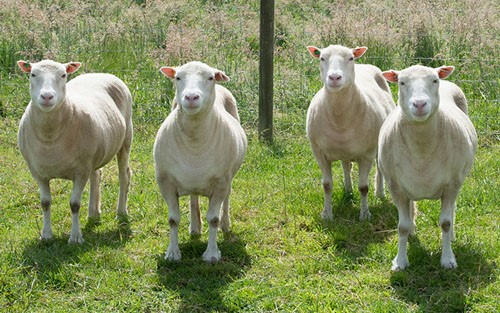July 26, published in the Nature Communications on the latest research reveals cloned sheep Dolly sisters do not necessarily cause premature aging.

4 sisters of Dolly
Researchers and animal welfare activists have been worried, cloning or somatic cell nuclear transfer, may cause health problems cloned animals. Researchers in the study July 26 in Nature Communications disclosed in, in 13 cloned sheep and found no sign of premature aging or other health problems.
Developmental biologist at the University of Nottingham Kevin Sinclair July 25 in Manchester, England on the European Science Open Forum, held a news conference, said: "These animals are very healthy, their life is also within the scope of our expectations for these animals."
That the challenge inherent in the concept of cloning brought premature
Cloning technology is an adult cell nucleus contains DNA implanted into an egg, the DNA was reprogrammed to an embryonic state. Dolly the sheep was born in 1996, was the first mammal to be cloned. Since then, researchers have cloned a variety of animals. This technique does not always work, many potential cloned animals die before birth or shortly after. Due to incomplete reprogramming of DNA, the surviving animals may have a variety of problems.
Dolly the sheep itself, so that we had an idea: that cloned animals are aging fast. Dolly have shorter telomeres. Telomeres protect the chromosome ends to prevent untie structure. Short telomeres and aging-related. Moreover, Dolly had severe arthritis. She was six years old, died of old age is not the time. Dolly and her flock where other sheep infected with a virus. It is caused by a virus physical exhaustion, only to euthanasia.
Reproductive physiologist at the US Texas A & M University, Katrin Hinrichs, said: "It's premature death, arthritis and short telomeres confusion in people's minds together, and come to the concept of cloned animals is premature." Hinrichs and other researchers not involved in the study also hoped that the new report can be corrected cloning and senescence. She said: "Now we have a reference for what is and what is not the result of cloning."
Also reproductive biologist at Texas A & M University's Mark Westhusin presentation even in a non-cloned animals, the animal is aging much faster there are differences. Westhusin cultivate a team where the first cloned cat Carbon Copy. It is now 15 years old, everything is normal. Westhusin said: "Now is a good published an article it has a lot of people believe something about cloning for a long period of time, with a more scientific set was validated.." Some studies even suggest that cloned animals may outlive traditional foster animals longer.
Dolly Sisters enjoy a normal life and health
In this study, Sinclair and colleagues examined 13 years of age from 7 to 9-year-old cloned sheep (the human equivalent of about 50 to 70 years). Wherein four sheep: Debbie, Denise, Dianna and Daisy are cloned from the same breast tissue to produce Dolly in 2007. Sinclair said: "We have four sisters and Dolly almost the same, this is a great opportunity to revisit that." He and his colleagues Dolly sisters and nine other cloned sheep aged 5-6 and traditionally bred sheep for comparison.
Cloned sheep have normal blood glucose, insulin levels and blood pressure. Few have mild arthritis. One clone Dolly Sisters moderate arthritis. The researchers also did not measure clone telomeres.
This study is the use of cloned sheep means the original technology based on modified cloning might produce a better result. But Dolly is not a problem because it is cloned, it is due to joint damage and suffering from arthritis. And it's not clear whether it is a short telomeres premature aging indicators. Of course, her death and was cloned unrelated, non-cloned animals in the flock died. In short, Sinclair said: "Maybe Dolly is not so lucky."
Hinrichs said cloning is now mainly in South America and Asia to do, not much in the United States. Polo horses and cattle are the most cloned animals. She said: "Cloning is so costly and inefficient, your animal must be a very special one, deserves to be cloned" so most cloned animals or performance superior varieties of rare animals. Some of the disease has a genetic resistance to be cloned animals for veterinary and medical research.
Souce: NovoPro 2016-07-29
